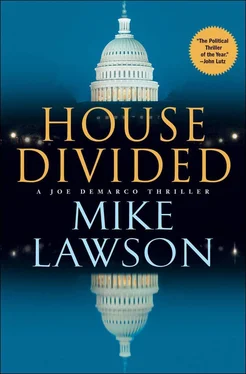Mike Lawson - House Divided
Здесь есть возможность читать онлайн «Mike Lawson - House Divided» весь текст электронной книги совершенно бесплатно (целиком полную версию без сокращений). В некоторых случаях можно слушать аудио, скачать через торрент в формате fb2 и присутствует краткое содержание. Жанр: Триллер, на английском языке. Описание произведения, (предисловие) а так же отзывы посетителей доступны на портале библиотеки ЛибКат.
- Название:House Divided
- Автор:
- Жанр:
- Год:неизвестен
- ISBN:нет данных
- Рейтинг книги:3 / 5. Голосов: 1
-
Избранное:Добавить в избранное
- Отзывы:
-
Ваша оценка:
- 60
- 1
- 2
- 3
- 4
- 5
House Divided: краткое содержание, описание и аннотация
Предлагаем к чтению аннотацию, описание, краткое содержание или предисловие (зависит от того, что написал сам автор книги «House Divided»). Если вы не нашли необходимую информацию о книге — напишите в комментариях, мы постараемся отыскать её.
House Divided — читать онлайн бесплатно полную книгу (весь текст) целиком
Ниже представлен текст книги, разбитый по страницам. Система сохранения места последней прочитанной страницы, позволяет с удобством читать онлайн бесплатно книгу «House Divided», без необходимости каждый раз заново искать на чём Вы остановились. Поставьте закладку, и сможете в любой момент перейти на страницу, на которой закончили чтение.
Интервал:
Закладка:
With Alice on his bumper, he continued on to the safe house, smiling slightly, feeling somewhat smug. He’d pulled it off.
“Hey, Alice, do I take the next left?”
“Yes,” Alice said, sounding all tight-jawed.
“You know, this is kinda cool. You’re like my own personal navigation system.”
“Shut up, DeMarco,” Alice said.
39
Charles Bradford was spit-shining his shoes when Levy entered his office. As a four-star general and the army’s chief of staff, Bradford obviously could have had some soldier shine his shoes but, as he’d told Levy once, he’d started spit-shining his shoes as a cadet at West Point and had always found the task relaxing in a Zen-like way. And he sounded relaxed now as he told Levy about DeMarco’s visit and the recordings DeMarco had in his possession.
“Why didn’t you detain him when he came here?” Levy asked.
“I considered that,” Bradford said. “And if you’d been here, I might have, but I didn’t want DeMarco talking to anyone other than you. Where have you been, John?”
“Trying to find DeMarco. I got copies of his phone records and I’ve been checking out people he calls frequently. One’s a woman, and based on how often he calls her, I’m guessing she’s his girlfriend. I found out she works at Langley and is out of the country right now, but I haven’t been able to get a fix on her location.”
“She’s with the CIA?”
“Yes, sir.”
“Could she be helping DeMarco?”
“I doubt it. I don’t know exactly what she does, but I do know she was overseas when all this started.”
“Well, don’t waste any more time on her,” Bradford said. “Everything’s going to be fine.”
Fine? “Sir,” Levy said, “you don’t seem very upset by all this.”
“Oh, I was very upset at first, John. And I imagine that’s what these people were counting on, me panicking and giving in to their demands, resigning because I was afraid they’d go public with what they know. But then I calmed down and thought things through.”
“So you’re not worried about DeMarco going to the media?”
Bradford ignored Levy as he placed his gleaming shoes on the floor, slipped back into them, and tied them with a double knot. “Of course I’m worried,” he said, “and if he did, it would be a three ring circus. But that’s not going to happen. I think DeMarco was telling the truth, and whoever he’s working with has the intelligence-or maybe the patriotism-to know that going public with those recordings would be bad for the country.”
“But what if they did release the recordings?” Levy said.
“John, they have no proof of anything. I suppose the president could order me to resign, but frankly I doubt he has the balls to do that. I’m more popular than he is. And I’d deny everything, of course, but a lot of people will still admire these things I’ve allegedly done.”
Levy didn’t like the way Bradford was acting. The calmness he was displaying was unnatural-and disconcerting. Bradford should have been angry, worried, demanding action. He should have been developing a plan to neutralize DeMarco and whoever was controlling him. It was as if DeMarco’s visit had shocked him so badly he was in a state of denial. Or was it possible, Levy wondered, that Bradford didn’t believe anyone could bring him down? Had he stepped over that thin line separating confidence from egomania?
John Levy thought all these things, but he said none of them. All he said was, “Sir, what do you want me to do?”
“Nothing. Don’t you understand, son? These people made a huge tactical blunder in sending DeMarco to me with those recordings. Now I know everything they know, and I know they have no evidence linking me to anything Martin did. And I’m about ninety percent certain that whoever’s helping DeMarco works for the NSA and this person realizes that to expose me he would have to expose himself, and he’s too much of a coward to do that.” Bradford inhaled deeply, centering himself. “They took their best shot, John-and they missed.”
Levy just stood there, not knowing what to say.
Bradford rose and came out from behind his desk. Putting an arm around Levy’s shoulders, he walked him toward the door.
“Go home, son,” Bradford said. “Get some rest. It looks like it’s been awhile since you’ve slept.”
Bradford wasn’t as confident as he had pretended to be with Levy. He was in an extremely vulnerable position, and the only way to negate that vulnerability was to do something he hated to do. He stood up and walked away from his desk, looked briefly out the window, then turned and looked at the photos and plaques on the wall behind his desk-the wall that told the story of his life.
There were photos of him at various stages of his career, from cadet at West Point to chief of the army. He was shown receiving medals, posed with other army generals, and shaking hands with four U.S. presidents. But it was the battlefield photos that meant the most to him: photos with combat troops-his troops-in every arena where the army had waged war in the last thirty-five years. In the center of the wall was the photo he loved the most, the photo that had appeared on the cover of Time magazine-the photo that launched his career and defined his life.
It had been taken when he was a second lieutenant in Vietnam, just after the battle for which he’d been awarded the Silver Star. The photographer had captured him in a shot that made it appear as if he was just stepping out of the jungle, pushing his way through an almost impenetrable wall of green foliage. His head was bandaged, the left sleeve of his shirt was missing and his left arm was bandaged from shoulder to elbow. In his right hand he carried an M-16. He was tall and lean and muscular, and his face was smudged with camo paint. And while he looked gaunt and haggard-when the photo had been taken he hadn’t slept in three days-his strength and his determination were evident in the grim set of his mouth and in his eyes. He was, in that photo, the nightmare warrior that no enemy would want to face.
His eyes moved from the Time cover to one of him standing next to Colin Powell when Powell occupied the chairman’s office. He had always liked Powell and had publicly supported him, but he’d always known that Powell wasn’t a Patton or a MacArthur-or a Bradford. The difference between those generals and Powell was that Powell didn’t have the stomach to willingly sacrifice a battalion if it meant winning a major battle, whereas men like Patton and himself had that sort of bloody resolve. It was this same quality that caused Lincoln to ultimately chose Grant over his other generals because Grant accepted that thousands of his own men would have to die to reunite the country. And it was not that men like Grant or Patton had been callous or unfeeling. They cared deeply for their soldiers-just as Charles Bradford cared deeply for every man and woman who wore an American uniform-but they understood that preserving a nation was more important than preserving the life of any one person, no matter how much you might love that person.
Bradford returned to his desk and picked up the phone.
Dillon smiled as he listened to Bradford’s phone call.
He was a lucky man. The button bug DeMarco had dropped on the carpet in Bradford’s office was battery-powered and would stop operating in the next half hour. Fortunately, Bradford had met with Levy before the battery died, and he made the phone call as soon as Levy left his office.
Someone had once said that it was better to be lucky than good-and Dillon was both lucky and good.
The most interesting thing about the discussion he’d just listened to between Levy and Bradford was that Bradford never told Levy that DeMarco knew who Levy was and knew what Levy had done.
Читать дальшеИнтервал:
Закладка:
Похожие книги на «House Divided»
Представляем Вашему вниманию похожие книги на «House Divided» списком для выбора. Мы отобрали схожую по названию и смыслу литературу в надежде предоставить читателям больше вариантов отыскать новые, интересные, ещё непрочитанные произведения.
Обсуждение, отзывы о книге «House Divided» и просто собственные мнения читателей. Оставьте ваши комментарии, напишите, что Вы думаете о произведении, его смысле или главных героях. Укажите что конкретно понравилось, а что нет, и почему Вы так считаете.












